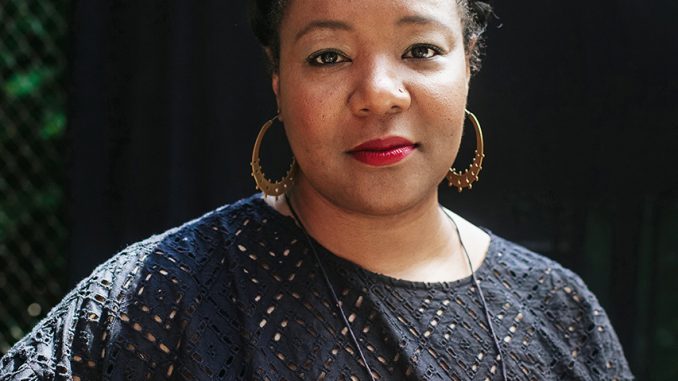
In the midst of the #MeToo movement, which focuses on sexual assault awareness and gender parity in Hollywood, Maori Karmael Holmes wants to “amplify the voices of Black and brown filmmakers” for a more progressive industry.
“Women filmmakers and filmmakers of color are not the gatekeepers of this industry,” said Holmes, a 2004 master’s of film and media arts alumna. “So I think oftentimes their work is overlooked or misunderstood or they’re being asked to conform to some kind of stereotypical storytelling style.”
Holmes founded the annual BlackStar Film Festival, a Philadelphia-based festival for global independent films, in 2012. The festival focuses on films made by Black artists from around the world about the African diaspora and indigenous communities, according to its website.
In February, Holmes began working as the executive director of ARRAY Alliance, which was founded by film director Ava DuVernay in 2010. ARRAY is an independent film distributor and resource collective for independent films made by women and people of color from underrepresented communities.
DuVernay has directed the award-winning films “13th” and “Selma.”
With the support from donors and fundraising directed by Holmes, ARRAY strives to highlight independent and underground filmmakers to provide varied voices, stories and images in cinema.
Holmes said she first created BlackStar as a “curatorial project” for people who normally wouldn’t have their work recognized at a film festival.
“[It’s] for those who go unnoticed or ignored by the mainstream film industry,” Holmes said. “You get an MFA, you make a film. The next trajectory is to take it to festival, and oftentimes it only lives in a festival circuit and then it goes away and disappears.”
“In a local context, BlackStar is important to Philadelphia so that people in Philly get an opportunity to see these films,” Holmes added.
Holmes, a California native, came to Philadelphia after studying history at American University in Washington, D.C. She said she was drawn to Temple for its success in producing documentary filmmakers and for the fellowship she was offered.
But even before college, Holmes discovered her interest in film as a middle schooler while watching documentaries on HBO and VH1.
“There was a part of me that really wanted to make [documentaries] initially,” Holmes said. “There was always some kind of storytelling, arranging my Barbies, making up stories, writing fictionalized accounts. I was always creating worlds in some way.”
Holmes has created several short films and documentaries, including her 2005 documentary “Scene Not Heard: Women in Philadelphia Hip Hop,” which recounts the influential women that framed the hip-hop genre in Philadelphia.
After finishing at Temple, she worked at the Netter Center for Community Partnerships in West Philadelphia, the Painted Bride Art Center and the Leeway Foundation. Later, Holmes was offered a job at the Institute of Contemporary Art in University City, where she worked as the director of public engagement. She said this job provided her with additional knowledge about creating and curating events in gallery and exhibition spaces.
“I was able to conceive a public program, identify audiences,” Holmes said. “I was [also] responsible for visitor experience and how one feels greeted. … So it really was a beautiful position drawing on all the experience that I had.”
After working with producer and digital media maker Sara Zia Ebrahimi on “KINOWATT,” a series of film screenings about social change in 2011, Holmes wanted to work on a new collaborative film project. This sparked her idea for BlackStar.
“I was interested in pursuing an independent idea that was focused on…African films, and then I started looking for titles that expanded to the African diaspora,” Holmes said. “Within a month or so, I had a whole festival on my hands.”
At first, Holmes wanted the project to be a one-day screening event but soon realized that so many films interested her that she decided to include them all in a four-day festival.
“When I realized that I had 40 films that I was interested in that had not screened in Philadelphia…it felt like there was a need to launch this festival,” Holmes said. “And because it was so successful, we continued to do it.”
This year, the festival will be held Aug. 2 through 5 at the Lightbox Film Center, ICA and the Pearlstein Gallery at Drexel University.
Denise Beek, a 2007 communications and mass media alumna, is BlackStar’s previous managing director and its current communications director. Beek met Holmes when she was a visiting professor at Temple.
Beek said Holmes brought a higher level of selectiveness in the process of choosing films for the festival.
“I think what Maori and the rest of the screening committee look for is an aesthetic excellence and production quality,” Beek said. “Does it look like there is intention behind the way the film was shot?”
“Is it a story that we feel portrays the Black experience?” she added. “Will it drive dialogue or educate people? Those are the kinds of questions we ask.”
Holmes moved back to California in early February to work with ARRAY Alliance, where she will organize events and fundraisers for the benefit of up-and-coming filmmakers.
“We know that we’re interested in supporting the communities that support these filmmakers and figuring out how to focus on crew members and craftspeople of the industry,” Holmes said. “All of this is important because of the cultural impact of whose stories we get to tell.”
Holmes said she would tell future filmmakers and producers to “follow your own North Star.”
“Figure out your own terms of success not thinking that there is a map that someone else can set for you,” Holmes said. “You should definitely collaborate with people, learn from other people’s journeys, but not to measure your success against someone else’s.”
UPDATE: This story has been updated to reflect new information.


Be the first to comment